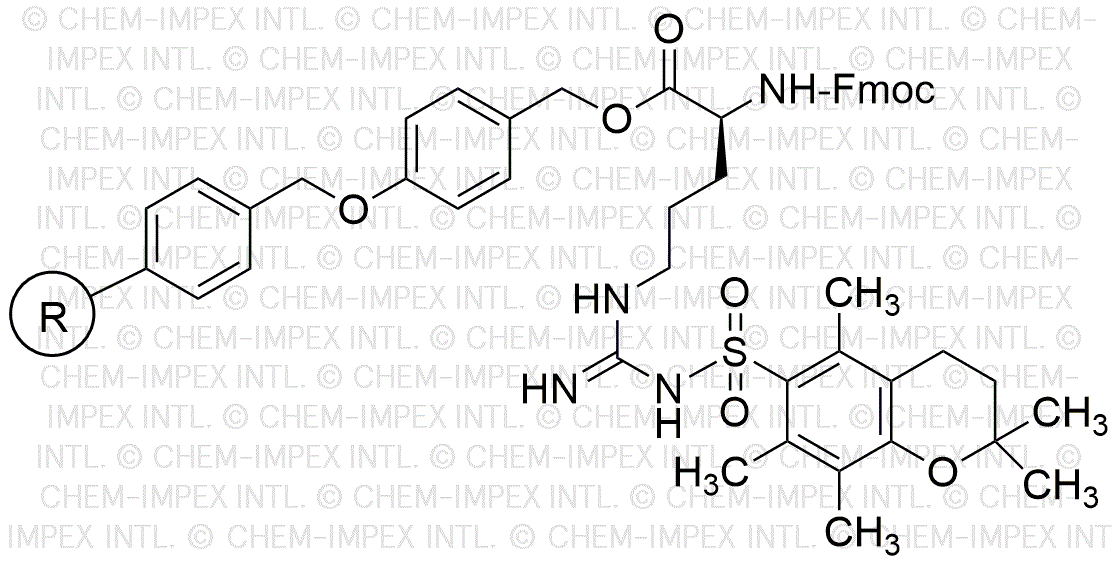Fmoc-L-Arg(Pmc)-Wang resin is widely utilized in research focused on
- Peptide Synthesis: This resin is essential in solid-phase peptide synthesis, allowing researchers to efficiently create complex peptides for various applications in drug development and biotechnology.
- Bioconjugation: Its functional groups facilitate the attachment of peptides to other biomolecules, making it valuable in the creation of targeted drug delivery systems and diagnostic tools.
- Research in Cancer Therapy: By enabling the synthesis of specific peptide sequences, it aids in the development of novel cancer therapeutics that can selectively target cancer cells.
- Vaccine Development: The resin is used to produce peptide-based antigens, which are crucial in the formulation of vaccines, enhancing immune responses against various pathogens.
- Protein Engineering: It supports the design of modified proteins with enhanced properties, contributing to advancements in enzyme technology and synthetic biology.
General Information
Properties
Safety and Regulations
Applications
Fmoc-L-Arg(Pmc)-Wang resin is widely utilized in research focused on
- Peptide Synthesis: This resin is essential in solid-phase peptide synthesis, allowing researchers to efficiently create complex peptides for various applications in drug development and biotechnology.
- Bioconjugation: Its functional groups facilitate the attachment of peptides to other biomolecules, making it valuable in the creation of targeted drug delivery systems and diagnostic tools.
- Research in Cancer Therapy: By enabling the synthesis of specific peptide sequences, it aids in the development of novel cancer therapeutics that can selectively target cancer cells.
- Vaccine Development: The resin is used to produce peptide-based antigens, which are crucial in the formulation of vaccines, enhancing immune responses against various pathogens.
- Protein Engineering: It supports the design of modified proteins with enhanced properties, contributing to advancements in enzyme technology and synthetic biology.
Documents
Safety Data Sheets (SDS)
The SDS provides comprehensive safety information on handling, storage, and disposal of the product.
Product Specification (PS)
The PS provides a comprehensive breakdown of the product’s properties, including chemical composition, physical state, purity, and storage requirements. It also details acceptable quality ranges and the product's intended applications.
Certificates of Analysis (COA)
Search for Certificates of Analysis (COA) by entering the products Lot Number. Lot and Batch Numbers can be found on a product’s label following the words ‘Lot’ or ‘Batch’.
Numéro de catalogue
Numéro de lot/série
Certificates Of Origin (COO)
This COO confirms the country where the product was manufactured, and also details the materials and components used in it and whether it is derived from natural, synthetic, or other specific sources. This certificate may be required for customs, trade, and regulatory compliance.
Numéro de catalogue
Numéro de lot/série
Safety Data Sheets (SDS)
The SDS provides comprehensive safety information on handling, storage, and disposal of the product.
DownloadProduct Specification (PS)
The PS provides a comprehensive breakdown of the product’s properties, including chemical composition, physical state, purity, and storage requirements. It also details acceptable quality ranges and the product's intended applications.
DownloadCertificates of Analysis (COA)
Search for Certificates of Analysis (COA) by entering the products Lot Number. Lot and Batch Numbers can be found on a product’s label following the words ‘Lot’ or ‘Batch’.
Numéro de catalogue
Numéro de lot/série
Certificates Of Origin (COO)
This COO confirms the country where the product was manufactured, and also details the materials and components used in it and whether it is derived from natural, synthetic, or other specific sources. This certificate may be required for customs, trade, and regulatory compliance.


